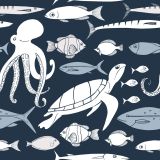In this article:
What is an Oceanography Degree?
An oceanography degree focuses on the study of the ocean, including its physical movements, chemical composition, marine life, and interactions with the atmosphere and climate. It combines elements of biology, chemistry, physics, and geology to help scientists understand how the ocean functions and how it impacts the planet.
Students in an oceanography program learn about ocean currents, waves, and tides, as well as the chemical makeup of seawater and how marine ecosystems thrive. They also study how the ocean influences weather patterns and climate change. Research and fieldwork are important parts of the program, allowing students to collect samples, analyze data, and explore oceanic processes.
Program Options
An oceanography degree is available at different educational levels, each providing specialized knowledge and career opportunities. Below are some program options:
- Associate Degree in Oceanography: This introductory program covers basic ocean science, including marine biology, ocean chemistry, and environmental conservation. It prepares students for entry-level jobs in marine research or as a foundation for further study.
- Bachelor’s Degree in Oceanography: This undergraduate program provides a broad understanding of physical, chemical, biological, and geological oceanography. Students learn about ocean currents, marine ecosystems, and climate interactions. Graduates can pursue careers in research, environmental protection, and marine industries.
- Master’s Degree in Oceanography: A graduate-level program that allows students to specialize in areas like marine geology, climate science, or marine conservation. It includes advanced coursework and research, preparing graduates for higher-level research positions or leadership roles.
- Doctorate in Oceanography (PhD): A research-intensive program focusing on deep scientific exploration of oceanic processes. PhD students conduct original research in topics like deep-sea exploration, climate change, and marine ecosystem dynamics. This degree is required for careers in academia, advanced research, and scientific policy-making.
Skills You’ll Learn
An oceanography degree teaches students a wide range of scientific, analytical, and technical skills that are valuable in research, environmental management, and marine industries. Below are some key skills learned in this program:
- Marine Data Collection and Analysis: Learning how to collect ocean samples, measure water properties, and analyze marine data using scientific instruments.
- Physical Oceanography Knowledge: Understanding ocean currents, waves, and tides, as well as their impact on global weather patterns and climate.
- Chemical Oceanography Techniques: Studying the chemical composition of seawater, including salinity, pH levels, and the effects of pollution and climate change.
- Biological Oceanography Understanding: Exploring marine ecosystems, food chains, and the impact of human activities on ocean life.
- Geological Oceanography Expertise: Investigating the structure of the ocean floor, underwater volcanoes, and plate tectonics to understand how the Earth changes over time.
- Remote Sensing and GIS Mapping: Using satellite data, sonar, and geographic information systems (GIS) to map ocean features and track environmental changes.
- Field Research and Laboratory Techniques: Conducting fieldwork on research vessels and analyzing collected samples in laboratory settings.
- Mathematical and Computational Skills: Applying math, statistics, and computer modeling to predict oceanic patterns and changes.
- Problem-Solving and Critical Thinking: Using scientific reasoning to address issues such as rising sea levels, marine pollution, and climate change.
- Communication and Collaboration: Writing scientific reports, presenting research findings, and working with teams in government agencies, environmental organizations, and academic institutions.
What Can You Do with an Oceanography Degree?
With an oceanography degree, graduates can pursue a variety of careers that involve studying and protecting the ocean environment. Here are some career options:
- Oceanographer: Specializes in one of the four areas: biological, chemical, physical, or geological oceanography. They study topics like ocean currents, marine chemistry, or underwater geology and often work for research institutions or government agencies.
- Marine Biologist: Studies marine organisms, their behaviors, and interactions with their environment. Often works in laboratories, aquariums, or out in the field, studying ocean life.
- Environmental Consultant: Helps businesses and organizations understand and manage their impact on the ocean. They work on projects related to pollution control, habitat restoration, or coastal development.
- Researcher: Conducts research on ocean ecosystems, marine animals, and ocean processes. Works for research institutions, government agencies, or environmental organizations.
- Coastal Resource Manager: Focuses on managing and protecting coastal areas, working with local communities and government agencies to create policies that balance development with environmental protection.
- Hydrographic Surveyor: Uses technology to map the ocean floor, which is important for navigation, building offshore structures, or studying changes in coastal regions.
- Marine Policy Specialist: Works with government agencies, nonprofits, or advocacy groups to develop and implement policies that protect ocean resources.

